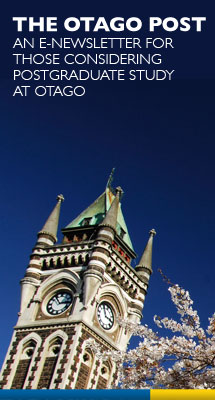 Friday 11 March 2016 11:44am
Friday 11 March 2016 11:44am
Dr Rebecca McLeod,
Department of Marine Science,
Department of Chemistry,
MacDiarmid Young Scientist of the Year - 2008.
Since winning the MacDiarmid Young Scientist of the Year award in 2008 Dr Rebecca McLeod has been to all sorts of interesting places, including Antarctica, Australian beaches, to an aquatic sciences conference in France, public appearances throughout the country and on University of Otago road shows.
But these days the young marine scientist can mostly be found in Otago's Department of Chemistry, where she is reacquainting herself with her chemical analysis skills to investigate in detail how energy flows through a coastal marine ecosystem.
Rebecca's prize-winning doctoral research helped to demonstrate the relationship between terrestrial forest and coastal marine communities in Fiordland, proving how the marine organisms depend on energy flowing from the land.
Her current research, conducted on a FRST postdoctoral fellowship and in conjunction with colleagues at Australia's Edith Cowan University, also explores food sources and productivity within a coastal marine ecosystem by tracing the compounds ingested by animals as part of their diet, but at the same time McLeod is investigating the tracing methodology itself to help establish its robustness.
"Increasingly this type of research has relied on the use of biomarkers - naturally-occurring chemical compounds that are transferred from one organism to another along the various links of the food chain," explains McLeod.
"People started using lipids as tools for this kind of research and calling these compounds biomarkers, but when I looked into it I found that their applicability hadn't been fully examined. So I saw this project as a chance to improve our understanding of these techniques."
This approach perhaps owes something to Rebecca's experiences as Young Scientist, for she admits winning the title has helped change the way she looks at science, particularly when formulating her research goals.
"I try to simplify the questions I want to ask and work out how the answers might affect and be interesting to people."
Rebecca was frequently approached to talk at schools and public meetings after receiving the MacDiarmid honour, and has recently been invited to participate in SciBlogs, a Royal Society of New Zealand science blog. She points out that over and above any personal career gains the Award is an opportunity to celebrate and raise the wider profile of science and comes with a responsibility to act as its advocate.
"There are a lot of great people doing great science that you just don't hear about," says McLeod, who is looking forward to helping communicate the science message to a wider audience.
